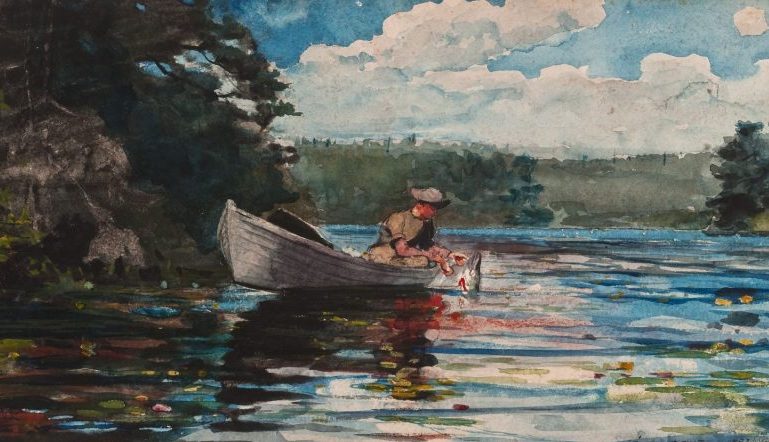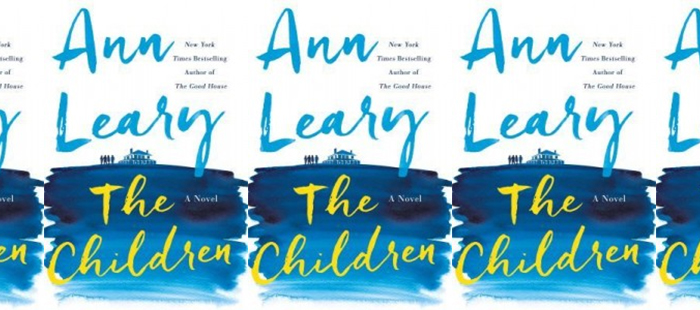
Guest post by Greg Schutz
Because I enjoy fishing and have several tech-savvy friends who do as well, Google will every so often sift through the contents of my GMail inbox and offer me a targeted advertisement from
PETA. “You wouldn’t impale a dog in the mouth,” the text reads, “so why would you do it to a fish?”
The obvious answer–“Because fish aren’t dogs”–is logical, perhaps; it’s also cold. It capitalizes on the rhetoric of the query without bothering to address its underlying concerns.
Determining what those underlying concerns really are, though, is tricky. At first, the question appears to be one of functional equivalency. Are the perceptual and experiential capabilities of fish and dogs functionally equivalent for the purposes of the question being asked? Raising this question, we might think we are making an appeal to neuroscience.
In fact, however, we are entering the pathless land of narrative.
In terms of both the expert testimony it includes and the reader commentary it has generated,
a recent Room for Debate article from the
New York Times website on the ethics of catch-and-release among fly-fishermen provides a very basic overview of the controversy; it may also illustrate the basic problem of the appeal to neuroscience: no matter how exhaustively the nervous system of a fish is described, the gap between scientific data and knowledge of a fish’s experiential world remains open. This being true, expert testimony on the subject–which is divided in the first place–tends to begin with scientific fact and end with personal anecdote: fish writhing on hooks or else being caught and released and going on to lead healthy, unremarkable, fishy lives. (From the NYT article, see
the testimony of Dr. James Rose.)
This slide from fact to anecdote is symptomatic of the basic problem. We are asking a question of science that science cannot answer: What is being felt by another?
This is the motivating question not of science, but of narrative.
When we enter the realm of the narrative, we are entering the realm of empathy and alienation, selfhood and otherness, the two poles of the spectrum along which we relate to characters in a story. The PETA ad spins a tale in which the hook is in the mouth of a ready target for our anthropomorphic empathy. You wouldn’t impale a dog in the mouth . . . . No outpouring of data could quell the upsurge of empathy we feel in response. And why should it? Good literature feels true, whether or not the story is factual. The heart has reasons that reason knows not–and this is true of empathy and anthropomorphism as well as love.
By the same token, I, like most fishermen I know, could tell you about the many fish I have caught–twice. Minutes after being hooked, played, landed, handled, and released, the same fish will sometimes strike again, to be caught and released again. In other words, whatever the content of the experience was for these fish, it was not enough to cause them to act afterward in a manner in any way different from that of a completely healthy, uncaught fish. Behaviorists, conclude what you will.
Opponents of fishing often construct a straw man from stories like these. Fisherpersons believe fish are stupid, they aver. But that’s not the point of such stories at all. The point, rather, is the utter inexplicability of the fish’s behavior in human terms. These stories reveal moments where anthropomorphism fails. To explain them entails recourse to a psychology, physiology, and experiential mode that is significantly non-human, and which therefore challenges the implicit analogy at the empathetic heart of the question of functional equivalency.
Still, I don’t expect such stories–PETA’s or my own–to convince anyone. Like PETA, I’m turning to narrative. I am othering the fish, just as others have tried to self them. The debate has collapsed into stalemated narratives.
* * *
Setting aside neuroscience for a moment, we might also ask what ethical rights and responsibilities fisherpersons and fish have, and whether any of those rights are violated in the act of fishing.
The question of what it means to grant animals ethical rights is an open one. Certainly, it can’t also mean compelling them to corresponding ethical duties, or else we’re going to find ourselves prying open the grouper’s mouth to save the wrasse within.
That we do not save the wrasse also suggests that an ethical right applied to an animal–not to be murdered, for example, to use the morally weighted term–is not inalienable but instead situational, a right that supposedly applies to all animals but which can compel a duty only from humans. It would seem to be a placeholder, then, a semantic trick–not a real right, but simply a reminder for us, as humans, to consult our own human moral compass in certain situations.
Still, attempts to deny groupers access to ethical rights on the basis of their inability as a species to perform a single act about which we could coherently speak of in ethical terms–the world of fish appears to be purely amoral–are likely to be met with accusations of what the philosopher
Peter Singer has dubbed
speciesism, a form of discrimination he has likened to racism and sexism. Never mind that racism and sexism are so appalling because there is absolutely no rational basis for making moral distinctions between races or genders, whereas there is an indisputably greater basis upon which to argue for moral distinctions between species. (Humans and groupers are indisputably more different than, say, human women and human men.) And never mind the fact that speciesism, on some level, simply has to be countenanced: as you read this, your own immune system is busily murdering countless protozoa.
Given the plight of groupers, wrasses, and protozoa alike, where should we draw the line? Which species receive rights, and which do not? Any answer must attempt recourse to science and animal experience, at which point it will be stalemated by narratives once again.
* * *
Narrative, it would seem, is inescapable in this debate as long as the case against sport fishing is founded on some form of anthropomorphism. Anthropomorphism and narrative are both fueled by empathy; the anthropomorphist treats animals as the author treats characters: he moves inside them, supplying their inner worlds to an audience.
There may be a parallel to explore here between the troubled fictional world we create in our literature and the troubled–and troubling–natural world around us.
The incoherence at the heart of the case for animal rights, as I see it, is the way it attempts to apply a philosophical concept that has arisen in highly individualist societies–rights–to the most collectivist of all cultures: the natural world. Taken to extremes, this is precisely the derangement that gripped
Timothy Treadwell.
Although I share Herzog’s deep suspicion of our natural anthropomorphic impulses, and although I recognize in his work the true and oftentimes chilling strangeness of nature, its utter lack of a human face, I do not find that lack of humanity nearly so disturbing as
Herzog seems to. Whereas Herzog, filming
Fitzcarraldo in the Amazon rainforest, is horrified by “the feeling and then the certainty that I was caught in a twilit prehistoric age, without speech or time,” this experience is exactly what I, as a fisherman, seek to court.
Geese appear high over us,
pass, and the sky closes. Abandon,
as in love or sleep, holds
them to their way, clear
in the ancient faith: what we need
is here. And we pray, not
for new earth or heaven, but to be
quiet in heart, and in eye,
clear. What we need is here.
Abandon, as in love or sleep: fishing, too, can involve the abnegation or at least the submergence of the self for a short time. Norman Maclean, a lifelong fisherman, understood this. The passages about fishing in
A River Runs Through It are beautifully written but for the most part mundane–descriptions of rocks, trees, trout. Occasionally, though, the narrator and his brother Paul seem to sink into the landscape.
Below him was the multitudinous river, and, where the rock had parted it around him, big-grained vapor rose. The mini-molecules of water left in the wake of his line made momentary loops of gossamer, disappearing so rapidly in the rising big-grained vapor that they had to be retained in the memory to be visualized as loops. The spray emanating from him was finer-grained still and enclosed him in a halo of himself. The halo of himself was always there and always disappearing, as if he were candlelight flickering about three inches from himself. The images of himself and his line kept disappearing into the rising vapors of the river, which continually circled to the tops of the cliffs where, after becoming a wreath in the wind, they became rays of the sun. [. . .]
The canyon was glorified by rhythms and colors.
Fishing, they are folded into sublimity for a few moments at a time.
I realize that I’m no longer making the kind of argument that’s likely to convince anyone, especially once I add that the essentially predatory nature of fishing–even catch-and-release fishing–seems to me necessary to moments like these. As a way of setting the stakes, perhaps, of making at least a ritualistic gesture toward the subhuman base of
Maslow’s hierarchy of needs, the predatory nature of fishing may have a way of sloughing us out of our human skins–of
abandoning them, to use Wendell Berry’s word–and allowing us to relate to the natural world in a much more intimate way than that to which we’re accustomed. Twilit, speechless, timeless:
What we need is here.
* * *
What literature needs, meanwhile, is trouble. A story without conflict is barely identifiable as such; a novel without at least the threat or intimation of a problem is at best an exercise in willful experimentation. Without trouble, literature simply isn’t that interesting.
Of course, what we need for our characters is rarely what we want for ourselves: “May you live in interesting times” is a curse, not a blessing.
So, too, with the natural world. From a human perspective, there’s something fundamentally awful about the way the universe is run. Whether they ingest dirt, leaf, or flesh, organisms must consume the biomass of other living or once-living organisms in order to survive.
The problem of animal pain–“Why would a God who is all-powerful, all-knowing, and all-good create a world in which its creatures must eat one another survive?”–has long been a problem of apologetics; the content of PETA’s concerns is far from historically new, though the policies it advocates in response may be.
In any case, the universe can be a horrifying place, and though our social constructions can insulate us from the facts to a certain extent, they can’t rob the facts of their truth or the truth of its force. Good literature thrills and discomfits us in part because it pits the human orderliness of literary form against the chaotic inhuman bustle that we sense in the world around us.
Like the readers and writers of literary fiction, the fisherperson places herself in a position of tension between the human and natural worlds. If fishing involves pain and appears brutal, it is for the same reason that literature involves trouble, loss, injustice, and thwarted desires.
There is, in my experience, a lesson to be learned from sport fishing that its opponents ignore at their own risk. If you try to interact with nature without acknowledging its brutality–the utterly remorseless and arbitrary application of which must be said to be part of its beauty–then you’re not interacting with nature at all. You’re at a zoo. You’re reading literature minus the trouble: no story, nothing to say. Walk through the woods without an awareness of the struggle all around you, the decomposed bodies that form the ground you walk on, and you might as well not even be there. You’re missing the forest and the trees.
It’s out of kindness and empathy that we ask questions like the one in the PETA ad, but our empathy in this case is anthropomorphic, and anthropomorphism has it backward. We shouldn’t be trying to place a human face on nature, we should be trying to find the natural world, faceless and silent, within us. Until we do, we will continue to keep the human world separated from the natural world. The environment will always be somewhere else, and never all around us. We must halt our hegemonic extension of human attributes over the natural world and remind ourselves that the natural world is what is, while our human world–with all its social constructions, including its individualism and its ethical rights–is the tidy burrow we’ve dug for ourselves.
But that burrow does not contain all we need, finally, for literature or for life.
This is Greg’s third post for Get Behind the Plough.


